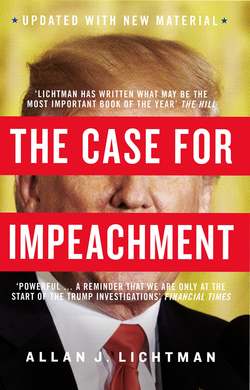Читать книгу The Case for Impeachment - - Страница 16
POLITICS WITHOUT CRIME
ОглавлениеIn the election of 1800, after one of the nastiest campaigns in U.S. history, the nation experienced its first political upheaval when the Democratic-Republican Thomas Jefferson defeated the Federalist incumbent president John Adams. Federalists attacked Jefferson for his alleged atheism, radicalism, and lack of moral standards. One propagandist warned that with Jefferson as president, “murder, robbery, rape, adultery, and incest will be openly taught and practiced, the air will be rent with the cries of the distressed, the soil will be soaked with blood, and the nation black with crimes.”6 The Jeffersonians fought back, charging Adams with scheming to extinguish the republic by marrying one of his sons to the daughter of the King of England and reestablishing British rule over America.
During this interregnum, John Adams pushed through the Judiciary Act of 1801, infuriating the victorious opponents. The act created sixteen new circuit court judgeships and reduced the size of the Supreme Court from six to five, thereby depriving Jefferson of an appointment. In the nineteen waning days of his presidency, Adams appointed so-called Midnight Judges to these new circuit court positions. When Oliver Ellsworth, the chief justice of the Supreme Court and an Adams loyalist, conveniently retired, Adams was quick to appoint the staunch Federalist John Marshall as his replacement. Marshall served as chief justice for more than thirty years.7
Jefferson and his new partisan majority in Congress repealed the Judiciary Act and turned to impeachment for rectifying what they decried as the Federalists’ packing of the courts. They carefully picked as their first target the elderly Federalist district court judge John Pickering, whose advanced dementia and alcoholism led to erratic and sometimes bizarre behavior on the bench. The impeachment of one of many federal trial judges may not amount to very much, but Jefferson and his allies in Congress targeted Pickering as part of a larger plan: to breach the separation of powers and place the constitutionally independent judiciary under the heel of the president and his party. Ironically, it was Thomas Jefferson, who famously had written in his “Notes on the State of Virginia” that concentration of power “in the same hands is precisely the definition of despotic government,” who led this assault on the separation of powers.
Jefferson as party leader set in motion the House’s proceedings against Pickering by transmitting to Congress “letters and affidavits exhibiting matter of complaint against John Pickering, district judge of New Hampshire, which is not within executive cognizance.” Eventually, Jefferson’s loyalists in the House drafted four dense articles of impeachment. None charged a specific violation of law, instead merely citing Pickering’s poor judgment, intoxication, and rants from the bench as evidence that he lacked the “essential qualities in the character of a judge.”8
The Senate convicted Pickering in a straight party vote, making him the first federal official removed from office under Article II, Section 4 of the Constitution. Senator William Giles of Virginia, the Jeffersonian leader in the Senate, said bluntly: “We want your offices, for the purpose of giving them to men who will fill them better.” Lynn W. Turner, the preeminent historian of the Pickering impeachment, wrote, “By confusing insanity with criminal misbehavior they [the Jeffersonians] also wiped out the line between good administration and politics and made any word or deed which a political majority might think objectionable the excuse for impeachment and removal from office.”9
Emboldened by Pickering’s successful conviction, the Jeffersonians next targeted the United States Supreme Court by impeaching Federalist justice Samuel Chase. In 1804, the House voted along party lines to charge Chase with eight articles of impeachment; seven turned on his allegedly unjust and partisan judicial conduct and rulings. The final article cited “intemperate and inflammatory” and “indecent and unbecoming” remarks that Chase made while charging a Baltimore grand jury. None charged him with an indictable crime. The Senate acquitted Chase on all articles, which ended Jefferson’s war on the judiciary but did nothing to clarify the grounds for an impeachable offense or stop similar maneuvers in the future.10
In his famed 1833 Commentaries, U.S. Supreme Court Justice Joseph Story reflected on the constitutional history of impeachment and the examples of Pickering and Chase. Impeachment, he concluded is “of a political character” and reaches beyond crimes to “gross neglect, or usurpation, or habitual disregard of the public interests, in the discharge of the duties of political office. These are so various in their character, and so indefinable in their actual involutions, that it is almost impossible to provide systematically for them by positive law.”11
The first impeachment of an American president, Andrew Johnson in 1868, would show just how prophetic Story’s words proved to be. Johnson’s impeachment raises three major issues that are still lively and controversial today: 1. What are the grounds for impeachment, 2. What is the scope of presidential authority and, 3. What is the president’s responsibility to obey the law?
